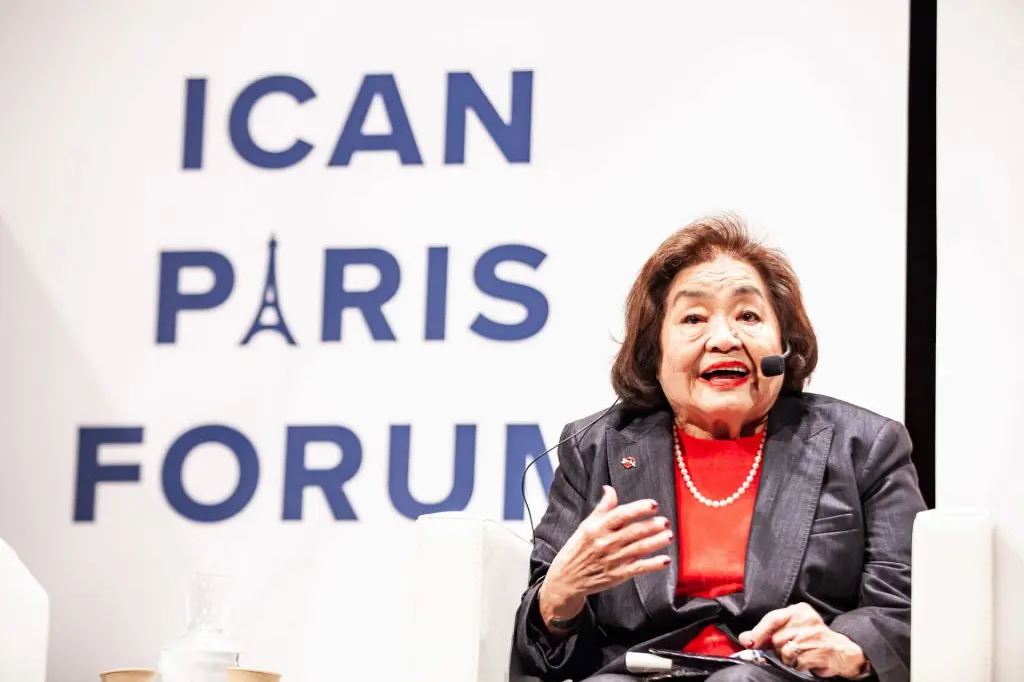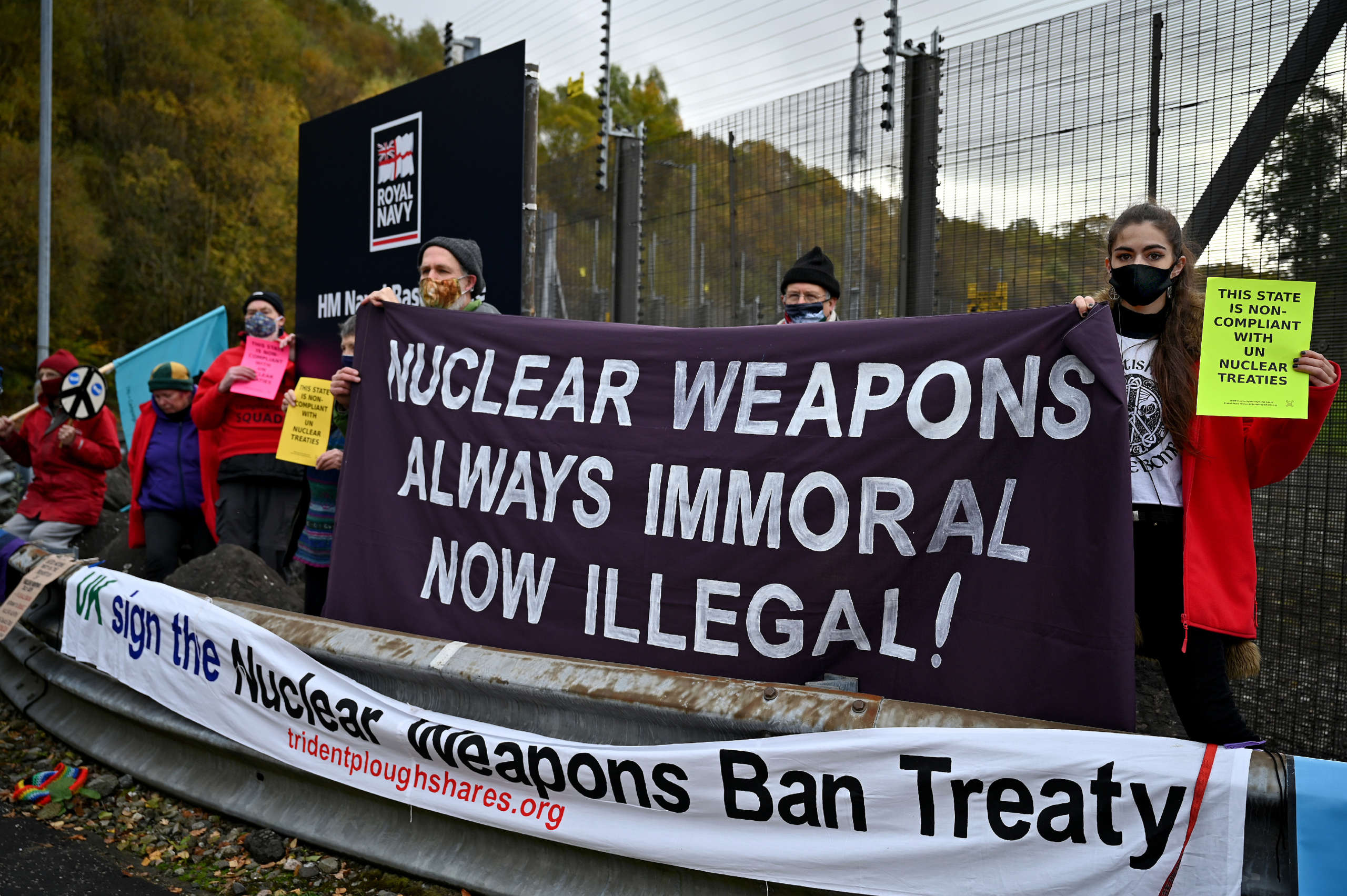Overview
The U.N. Treaty
on the Prohibition of Nuclear Weapons
On 7 July 2017 – following a decade of advocacy by ICAN and its partners – an overwhelming majority of the world’s nations adopted a landmark global agreement to ban nuclear weapons, known officially as the Treaty on the Prohibition of Nuclear Weapons. It will enter into legal force once 50 nations have signed and ratified it.
Prior to the treaty’s adoption, nuclear weapons were the only weapons of mass destruction not subject to a comprehensive ban, despite their catastrophic, widespread and persistent humanitarian and environmental consequences. The new agreement fills a significant gap in international law.
It prohibits nations from developing, testing, producing, manufacturing, transferring, possessing, stockpiling, using or threatening to use nuclear weapons, or allowing nuclear weapons to be stationed on their territory. It also prohibits them from assisting, encouraging or inducing anyone to engage in any of these activities.
A nation that possesses nuclear weapons may join the treaty, so long as it agrees to destroy them in accordance with a legally binding, time-bound plan. Similarly, a nation that hosts another nation’s nuclear weapons on its territory may join, so long as it agrees to remove them by a specified deadline.
Nations are obliged to provide assistance to all victims of the use and testing of nuclear weapons and to take measures for the remediation of contaminated environments. The preamble acknowledges the harm suffered as a result of nuclear weapons, including the disproportionate impact on women and girls, and on indigenous peoples around the world.
The treaty was negotiated at the United Nations headquarters in New York in March, June and July 2017, with the participation of more than 135 nations, as well as members of civil society. It opened for signature on 20 September 2017. It is permanent in nature and will be legally binding on those nations that join it.
Why a ban?
Nuclear weapons are the most inhumane and indiscriminate weapons ever created. That is why it is time to end them, before they end us.
Nuclear weapons are the most inhumane and indiscriminate weapons ever created. They have catastrophic humanitarian and environmental consequences that span decades and cross generations; they breed fear and mistrust among nations, as some governments can threaten to wipe out entire cities in a heartbeat; the high cost of their production, maintenance and modernisation diverts public funds from health care, education, disaster relief and other vital services. Banning these immoral, inhumane weapons under international law was a critical step along the path to ending them.
With the adoption of the UN Treaty on the Prohibition of Nuclear Weapons (TPNW) on July 7th, 2017, the world's majority took a critical step towards making that nuclear-weapon-free future a reality.
Nuclear Weapons Have Always Been Immoral. Now They’re Illegal.
On 7 July 2017, the Treaty on the Prohibition of Nuclear Weapons (TPNW) was adopted by the UN General Assembly. Just over three years later, the TPNW reached the 50 national ratifications needed to become international law. The treaty will enter into force on January 22, 2012, and nuclear weapons will become officially illegal under international law. This day will represent a culmination of years of campaigning for nuclear weapons to be reframed as a collective humanitarian problem, one which requires prohibition and elimination, rather than a national military defense asset that needs to be managed and even upgraded.
Nuclear weapons have always been inhumane and unacceptable, soon they will be illegal – Tilman Ruff
“The radioactive incineration unleashed by nuclear war involving even less than 1% of the global nuclear arsenal targeted on cities in one part of the world would be followed by a worldwide nuclear ice age and nuclear famine, putting billions of people’s lives in jeopardy.”
On Saturday 24 October 2020, Honduras brought the number of nations ratifying the United Nations Treaty on the Prohibition of Nuclear Weapons (‘TPNW’) to 50. This milestone means that after 90 days have elapsed, on 22 January 2021, the treaty will enter into legal force, becoming international law and binding on the states that have ratified it, and all those which ratify in future. The treaty will, however, stigmatise nuclear weapons for all states, whether or not they join the treaty.
It is fitting that 24 October also marked the 75th anniversary of the founding of the UN, ‘determined to save succeeding generations from the scourge of war’. The very first resolution of the UN General Assembly, on 24 January 1946, established a commission to develop a plan for the elimination of atomic weapons.
This is a historic achievement and an enormous win for humanity and planetary health. Outlawing nuclear weapons is an essential step towards eliminating them, which is the only reliable way to prevent their use.
ONE YEAR OF U.S. NUCLEAR WEAPONS SPENDING WOULD PROVIDE 300,000 ICU BEDS, 35,000 VENTILATORS AND SALARIES OF 75,000 DOCTORS
MATTHEW IMPELLI | newsweek.com
The amount of money spent in one year by the U.S. on nuclear weapons could instead provide 300,000 ICU (intensive care unit) beds, 35,000 ventilators and 75,000 doctors’ salaries, according to the International Campaign to Abolish Nuclear Weapons (ICAN)–a “coalition of non-government organizations promoting adherence to and implementation of the UN [United Nations} nuclear weapon ban treaty.”
In its recent report, the group stated that, according to armscontrol.org, the U.S. spent $35.1 billion on nuclear weapons in 2019. The costs are based on reported averages, but the study noted that the $35.1 billion in nuclear weapons spending would instead pay for “300,000 beds in intensive care units, 35,000 ventilators, and the salaries of 150,000 U.S. nurses and 75,000 U.S. doctors.”
“Proud to be an American?” What an American admiral forgets about nuclear war
“Today, all these years later, the Trump administration is much more focused on acquiring new nuclear weapons systems than constraining or eliminating them. And the White House seems all too eager to walk away from the treaties and tools that were built to reduce these weapons’ greatest risks.”
MONICA MONTGOMERY | thebulletin.org

In late February, Adm. Charles Richard, head of US Strategic Command, told a House committee that the innovations going into a new nuclear warhead are what make him “proud to be an American.”
He was referring to the W93, a new nuclear warhead that will be used on submarine-launched ballistic missiles and that the Trump administration wants $53 million to start work on this year. While the design and timeline remain unclear, the administration forecasts that the price tag for developing and building this new weapon will reach over $1 billion per year in the next four years. The W93 would join or replace at least three other submarine-launched nuclear warheads that already exist and for which billions already have been and are still being spent to modernize.
Key Messages from the 2019 Doomsday Clock Announcement – ICAN
ICAN (International Campaign to Abolish Nuclear Weapons) believes that the success of people-powered change and the leadership of the majority of nations supporting the TPNW is a positive development these last years. ICAN’s success and the TPNW is a turning point for the world, and we will be working to turn it backwards from now.
Topline
– The success of the Treaty on the Prohibition of Nuclear shows that the vast majority of nations are taking action to solve the problem of nuclear weapons.
– A global movement against nuclear weapons is starting to turn the tide against nuclear weapons.
– Nuclear weapons are inhumane weapons of mass destruction that targets civilian populations and their use will violate international laws. The threat of Doomsday will exist until we eliminate these weapons. It is the only sane thing to do.
Supporting message
– We have many reasons to be hopeful, 70 countries have signed the Treaty to ban all nuclear weapons and the Treaty on the Prohibition of Nuclear Weapons is on its way to enter into force within a year
– Nine states are continuing to threaten the world with their weapons of mass destruction. We can’t simply wait for them to reverse course, all governments, cities, parliamentarians and people must contribute to nuclear disarmament efforts by supporting the TPNW
– We need to continue bringing democracy to disarmament in the face of unilateral threats to the security of humanity
– Trump has proven that when it comes to nuclear weapons agreements he is a wrecking ball not a builder. By undermining the INF treaty, the United States and Russia must stop celebrate their ‘Doomsday’ capabilities and return to the negotiating table to stop the new nuclear arms race.
Europe specific
– A new nuclear arms race between the US and Russia threatens the cities of Europe. This is the moment for Europe to show leadership by ending their obstruction to the Treaty on the Prohibition of Nuclear Weapons and make it clear they will not participate in a new arms race.
“Away from the media spotlight, massive progress is being made by a broad coalition of people dedicated to prohibiting and eliminating nuclear weapons. Stopping the slide towards midnight in the past year has been a Herculean task but we are slowly but surely turning the corner on a new more secure future. While the US and Russia embark on a new nuclear arms race, 70 countries have signed the Treaty to ban nuclear weapons, cities and regional governments are committing to the Treaty, and banks and pension funds are divesting from nuclear weapons production. Yes, there is so much work still to be done to save us from these reckless nuclear armed states, but today is a day to recognise the progress we are making for sanity in the face of irrational threats.”
Beatrice Fihn – Executive Director
International Campaign to Abolish Nuclear Weapons
ICAN IGTV
The international campaign to abolish nuclear weapons on instagram (@nuclearban) tackling some of the more technical legal questions of the treaty: what does entry into force mean, what happens now? Joined with experts, they dive into international law and the TPNW (without getting too technical!) through instagram chats to help break it all down.
View this post on InstagramTim Wright in conversation with Associate Professor Treasa Dunworth of the University of Auckland
A post shared by ICAN (@nuclearban) on
View this post on InstagramA post shared by ICAN (@nuclearban) on
View this post on InstagramA post shared by ICAN (@nuclearban) on
Resources
Nothing Found
It seems we can’t find what you’re looking for. Perhaps searching can help.
Nothing Found
It seems we can’t find what you’re looking for. Perhaps searching can help.
Quotes
Nothing Found
It seems we can’t find what you’re looking for. Perhaps searching can help.



